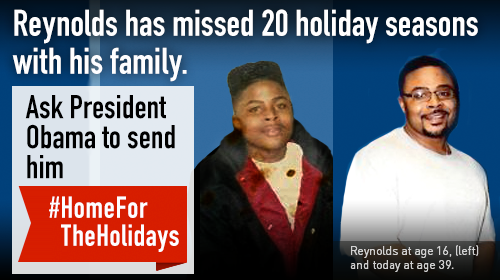
I joined a drug ring when I was 17 years old and, for just over a year, sold crack and powder cocaine in Rockford, Ill. I was arrested when I was 19 years old.
I am now 39 years old. I have spent over half of my life in federal prison. I have been gone from a world that witnessed the advent of smartphones, digital cameras, and GPS technology. More personally, I have been gone from my family. I have missed 20 years of graduations, funerals, and carved turkeys for the holidays. For my very first conviction, I paid with the entire balance of my freedom.
And I am destined to die here, unless President Obama commutes my life without parole sentence. Presidential pardons are usually handed out the week of December 22nd. There are thousands who think it's time I went home.
Two decades ago, I stood before a federal judge who reluctantly sentenced me to life in prison. Everyone in the courtroom – the prosecutor, the judge, my lawyer – said the sentence was too harsh. But the federal formula was unwavering: it required exponentially harsher penalties for crack offenses, compared to offenses exclusively involving powder cocaine. My life sentence is the product of an unjust legal formula that has since been abandoned.
I do not deny the devastating effects of drug addiction. I know those effects firsthand. Both of my parents were drugs addicts. When I was 11 years old, I found my mother dead from a heroin overdose. I was sent to live with my grandmother, who herself was a well-known Rockford cocaine dealer. I was raised in a crack and prostitution house where adult family members taught me how to cook, package and sell cocaine. My childhood does not excuse my crime. It only explains the road I have traveled.
My clemency petition raises one fundamental question: is permanent banishment from society the only answer for a teenager who, with no prior convictions, joins a drug ring and spends a little over a year peddling crack and powder cocaine? I believe the answer is no. Rehabilitation is possible. I have a 20-year record of achievement to prove it. Even in the face of a mandatory life sentence, I have spent the last 20 years working to grow from an immature boy to a productive man. I have completed a 4,100 hour teaching apprenticeship to become a U.S. Department of Labor certified Teacher's Aide. I am a certified victim impact counselor. I am a companion for the inmate suicide prevention program. I teach in the Federal Bureau of Prisons reentry program, which prepares inmates for successful community reentry.
The person I have grown into is my way of apologizing to everyone I have ever wronged.
My clemency petition does not ask President Obama to rewrite constitutional law or legislate policy with the presidential pen. Congress and the Supreme Court have recently recognized that unjust mechanisms were a part of the federal sentencing machinery that resulted in my life sentence. Legislatively, the Fair Sentencing Act of 2010 is a bipartisan rejection of the unwarranted disparity between crack and powder sentences. Judicially, the Supreme Court, in Miller v. Alabama, said that it is unconstitutional to sentence any juvenile – even a juvenile murderer – to a mandatory life sentence.
Regardless of whether I am a juvenile offender by legal definition, the basic principles of Miller certainly apply. I am serving a life sentence for a drug crime that began and ended when I was just a teenager. If the Constitution prohibits a life sentence for juvenile murderers, then why must I die in prison for a first-time, nonviolent drug offense?
With each passing day, the constitutional and penological justifications further erode from the compulsory life sentences for thousands of nonviolent drug offenders like me. Both the federal judge who sentenced me and the prosecutor's office support my commutation. My request to President Obama contained the signatures of thousands of ordinary Americans, over 50 law schools, and numerous public servants and mobilized organizations, all of whom support commutation.
Learn more about criminal law reform and other civil liberty issues: Sign up for breaking news alerts, follow us on Twitter, and like us on Facebook.

